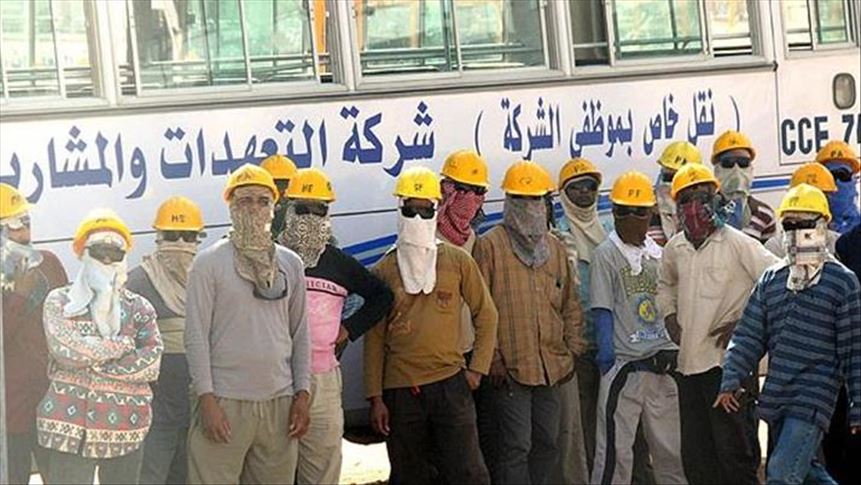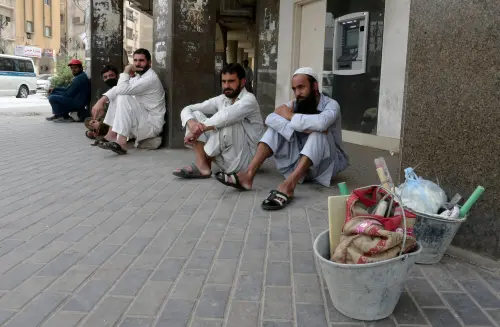Saudi Arabia has carried out a sweeping immigration operation that led to the deportation of more than 12,000 foreign nationals in early November, part of a nationwide campaign that targeted illegal residency, labor, and border-security violations. The campaign, described by some observers as a hardline and “Trump-style” crackdown because of its scale and speed, detained tens of thousands across the country and resulted in thousands being returned to their countries of origin.CrackdownSaudi Arabia has carried out a sweeping immigration operation that led to the deportation of more than 12,000 foreign nationals in early November, part of a nationwide campaign that targeted illegal residency, labor, and border-security violations. The campaign, described by some observers as a hardline and “Trump-style” crackdown because of its scale and speed, detained tens of thousands across the country and resulted in thousands being returned to their countries of origin.
What Happened and When
Between October 30 and November 5, Saudi security forces, working with multiple government agencies, conducted coordinated inspections across cities and workplaces. Authorities reported that the operation led to the detention of more than 21,000 people for various violations, with roughly 12,000 of them subsequently deported for residency and labor infractions. The government described the effort as an enforcement of existing immigration and labor laws designed to preserve public order and maintain labor-market balance.
Who Was Affected
A large share of those detained and deported were African migrants, including Ethiopians, Nigerians, Sudanese, and Egyptians. Many of them had traveled to Saudi Arabia in search of better opportunities and stable income to support their families back home. For these individuals, deportation meant the sudden loss of livelihood, security, and hope. Their journey, often marked by sacrifice and ambition, came to an abrupt halt as they were sent back home with uncertainty hanging over their futures.
The Human Cost Behind the Numbers
Behind every number is a story. Each statistic represents a disrupted life a mother who left her children behind to work as a domestic helper, a young man who took risks to earn money for his family, or a father who overstayed his visa when his job was lost. Detention centers quickly became overcrowded, filled with people whose plans for a better life were shattered in a moment.
For many families back home, deportation meant financial chaos. The remittances that once paid for food, rent, or school fees abruptly stopped. Children faced dropped education, homes went into debt, and families struggled to make ends meet. The emotional toll was immense, with families torn apart by distance, fear, and uncertainty. The human dimension of this crackdown paints a picture not just of law enforcement, but of human hardship that extends beyond borders.

Why the Government Says It Acted
Saudi authorities emphasized that the campaign was a legal and administrative enforcement action rather than a political one. Officials stated that the crackdown targeted individuals living or working in the country without valid permits, as part of a broader effort to secure the nation’s borders and regulate its workforce. The operation was aligned with the government’s long-term labor reforms aimed at creating more job opportunities for Saudi citizens, particularly the youth, and reducing dependence on undocumented foreign labor.
Government spokespersons highlighted that the measures were necessary to maintain public safety and ensure fair competition in the job market. By enforcing labor and residency laws, the government aims to promote economic stability and national development while ensuring that employment opportunities are reserved for those with legal status.
The Penalties and Legal Framework
Saudi Arabia’s laws on residency and labor violations carry severe penalties for both violators and those who facilitate such activities. Individuals who employ or harbor illegal residents face heavy fines, potential imprisonment, and even deportation in some cases. Employers are being urged to follow strict verification and registration processes to avoid penalties.
The government’s approach underscores its zero-tolerance policy toward illegal employment and border violations. Officials believe that strict enforcement acts as a deterrent and encourages regularization of the workforce, ensuring a more controlled and transparent labor environment.
Economic and Political Context
The mass deportations come against the backdrop of Saudi Arabia’s ambitious economic reform agenda under Vision 2030. The plan aims to diversify the economy, strengthen national industries, and empower Saudi citizens through new job creation. One major objective is to reduce dependency on foreign labor in sectors where Saudis can be trained and employed.
This policy shift has made labor market nationalization a top priority. While it brings opportunities for local citizens, it also places pressure on migrant workers, many of whom fill low-wage or informal roles that locals may be reluctant to take. Balancing economic goals with humanitarian responsibilities remains a challenge, especially when abrupt enforcement measures affect vulnerable communities.
Personal Stories and Ripple Effects
In the aftermath of the deportations, migrant neighborhoods across Saudi cities felt the immediate impact. Many homes were left empty overnight as workers were detained or deported. Employers who relied on informal labor faced work disruptions, and families lost trusted helpers and caretakers.
Across the Red Sea and in parts of Africa, the effects were equally visible. Families awaiting remittances found themselves without financial support. Community groups and humanitarian organizations struggled to help returnees who arrived home without savings or resources. Many returnees now face uncertain futures, with limited job prospects and growing economic hardship.
These ripple effects highlight the deep interdependence between labor migration and family survival. For many, migration is not a choice but a necessity, and deportation doesn’t end their struggles it merely shifts them back to their countries of origin, where opportunities are often scarce.
Reactions at Home and Abroad
Within Saudi Arabia, reactions to the operation have been mixed. Some citizens view it as a necessary measure to uphold national laws and protect jobs for locals. Others express concern about the humanitarian consequences and the conditions of those detained. Internationally, several African governments have called for better coordination to ensure safe and dignified repatriation of their citizens.
Human rights advocates have also urged Saudi authorities to adopt a more compassionate approach, emphasizing that due process and humane treatment should be integral to any enforcement campaign. Embassies and international organizations continue to negotiate the return and reintegration of affected individuals, while monitoring detention and deportation conditions.

Broader Implications for Migration Patterns
Large-scale deportations often reshape migration trends rather than end them. In the short term, stricter enforcement can deter undocumented migration, but economic necessity tends to push people to find new routes or methods to reach their destinations. The demand for labor in Gulf economies, combined with limited opportunities in home countries, ensures that migration pressures remain high.
Experts warn that without safe and legal migration channels, people will continue to take risks through irregular routes, exposing themselves to exploitation or trafficking. The challenge for both sending and receiving countries is to build sustainable migration systems that respect human rights while meeting economic needs.
What Could Reduce Harm
Experts argue that humane and transparent enforcement policies can help mitigate the human cost of such crackdowns. Steps such as ensuring proper legal representation, providing access to consular services, and creating clear communication channels about workers’ rights can make deportations less traumatic.
Additionally, creating legal pathways for temporary work or seasonal employment could help regularize the flow of labor. Bilateral agreements between Saudi Arabia and migrant-sending countries could also facilitate safer migration and reintegration. Rehabilitation programs for deportees, skill-building initiatives, and reintegration grants are essential to help returnees rebuild their lives.
The Moral Question: Balancing Sovereignty and Compassion
At the heart of this issue lies a moral dilemma how to balance national sovereignty with compassion. Every country has the right to enforce its laws and regulate who enters and works within its borders. Yet, the execution of these laws should not come at the expense of human dignity.
Migrants are not just statistics; they are individuals with dreams, responsibilities, and loved ones. Treating them with fairness and empathy, even in enforcement, upholds the values of humanity. True leadership is measured not only by strength but also by the ability to act with compassion, even in difficult circumstances.
Voices That Need to Be Heard
To fully understand the impact of such operations, it is important to hear from those directly involved. Migrant workers and their families can offer first-hand perspectives on their experiences and challenges. Employers and local communities can shed light on the economic realities and dependencies that shape labor relations. Policymakers, in turn, must listen to all sides to create balanced, humane, and effective migration frameworks.
Listening to diverse voices helps bridge the gap between enforcement and empathy. It ensures that policy decisions reflect both the need for national order and the human realities that underpin migration.
Looking Ahead
The recent deportations are likely to shape Saudi Arabia’s migration and labor policies for years to come. The government has made it clear that maintaining national employment priorities and enforcing residency laws will remain top objectives. Yet, the future will also depend on how effectively Saudi Arabia collaborates with migrant-sending nations to create legal and safe pathways for workers.
Efforts to strengthen regional cooperation and provide support for reintegration can help reduce the cycle of illegal migration. For many returnees, the path ahead will be difficult, but it also offers an opportunity for rebuilding and renewal. The focus must now shift toward sustainable solutions that protect both national interests and human rights.
A Final Thought
The mass deportation of over 12,000 migrants from Saudi Arabia is a significant moment in the region’s ongoing effort to balance law enforcement, economic goals, and humanitarian values. It reminds us that migration is not just about policies it is about people.
Enforcement will always be part of the migration conversation, but it must be paired with understanding and compassion. When nations choose to uphold the law with humanity, they demonstrate true strength and moral leadership. The path forward for Saudi Arabia and its migrant communities lies in cooperation, empathy, and a shared vision of dignity for all who seek a better life.
Do follow Gulf Magazine on Instagram.
Also Read – Audi Launches All New A6 in Saudi Arabia, Boldly Refined



